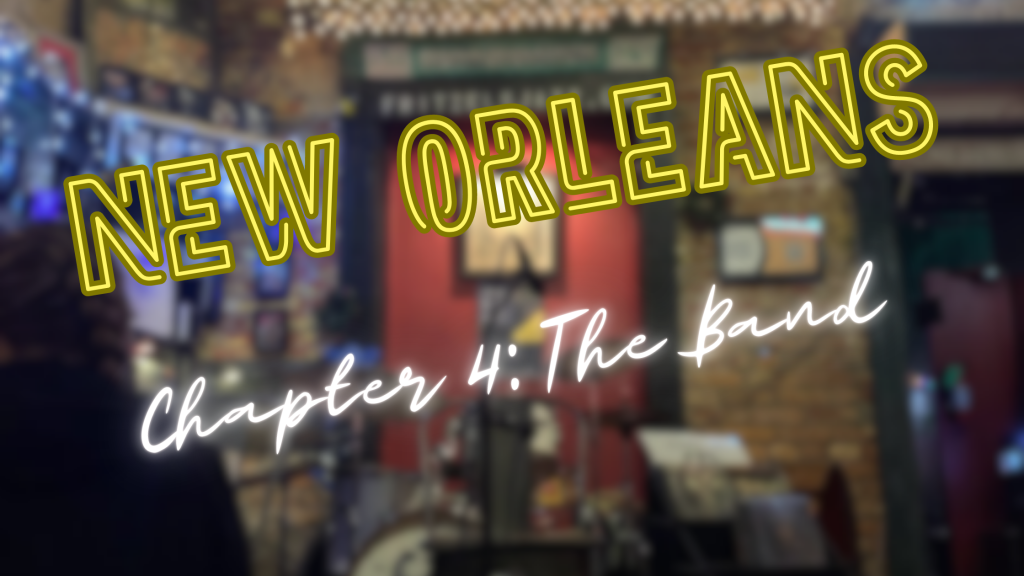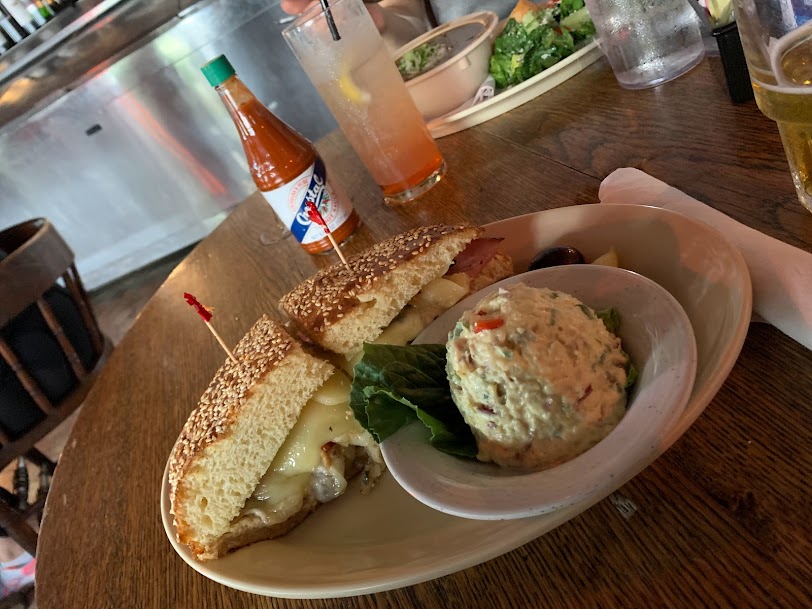
The evening started at a place called Napoleon House. It is a squat and storied structure, every inch of the space, the countertops, covered in some painting that looks iconic, some knick-knack that seemed to have arrived at this final resting place by way of shenanigans and mischief. The place was originally built in 1791, the plot purchased in an estate sale by a man who would later go on to become the mayor of New Orleans. He offered the home as a place of refuge for Napoleon should he ever escape his exile. Napoleon gave it a hard pass, but that didn’t stop them from naming the place after him. There is a cracked apart beauty to that place. A flawed perfection in the carefully selected eccentricities of it, a deliberateness about its imperfections that give them an air of well-earned scars.

But the food. Oh god, the food. If they’d been turning out muffulettas like that in the 1800’s Napoleon would have swum over from Elba. Bright, briny, goodness, sharp and unique like they make the olives in-house, each bite punctuated by a forkful of potato salad like a palette cleanser. Jesus. Mel’s seafood gumbo whispered a bunch of naughty shit to her and she liked it.

With that rolling like a tropical storm in our stomachs, we wandered the French Quarter, high as kites. Music tumbled out of doorways, bounded off the walls and down the alleyways and we found ourselves punchdrunk at the door of the Dauphine book store. We lost ourselves in there for the better part of an hour and then sun was setting over the Mississippi as we wandered the rising swell of the French Quarter.
A man fingerpicking a guitar stopped playing midway through a song because the 6 O’clock church bells started tolling. “Gotta respect those church bells,” he said matter-of-factly and we all nodded our heads. Doreen Ketchens played the ever-living-fuck out of a clarinet on Chartre street, the notes arc-flashing out of that instrument like live electricity, everyone’s hair standing on end. The roar of motorcycles and midlife crisis, the smell of fried food and the hum of bodies in transit through a place of complicated magic in the failing light of day.

Full dark found us shoulder to shoulder in a swaying seagrass of strangers, moving to the sound of music, jazz music that is bright and singular and powerful. Fritzel’s is a staple in the French Quarter. A place where jazz is made and where people go to watch it and be washed over by it. The 6 O’clock jazz band was comprised of a trumpet player, a pianist, a bassist, a drummer, and sax man. They wore suits and there was a storied experience about them that filled you with a sense of safety. These men knew what they were doing. The music ran through them and because it trusted them, you trusted them. These men would not miss a chord or stumble over an arpeggio. These men wouldn’t be flustered by the clinking of glasses or the raucous thunder of drunken laughter. These men would keep playing if the walls went up in flames.
There was an old fashioned clutched in my fist and it was as sweet and biting as the jazz and like the jazz, I was savoring it and like the jazz it was going, steadily and unimpeded, straight to the softer parts of me. The band finished a rendition of ‘Walking or Riding’ with whipcrack rip of the trumpet and the trumpeter took the mic in his free hand and did some crowd work while the waitresses circulated and the hands went to glasses. The trumpeter made a joke or two about the weather, did an abbott and costello-y bit with the guy on the piano.
“He’s good,” the man beside said. His name was Javid. He was in his 60’s, thickly mustachio’d and had a lightness, an openness, about him that was completely disarming. Within 15 minutes of shaking his hand I was helping him with his phone like a dutiful grandchild and he had told me that he was Iranian by birth, Chicagoan by choice, that he visited New Orleans at least once a year just for the jazz, that his girlfriend Nancy was the love of his life and that he was planning on proposing to her on this trip. “I like his comedy,” Javid said and I concurred, took another nip off my Old Fashioned, let my eyes wander the bar.
There was something about that place. Something I couldn’t define, like a bass-line humming through the foundation of it, and if I googled the place now as I write this and discovered that it was closed because historians had discovered that it lay atop the entrance to Shangri-Fuckin-La, I would cock back my head and say, ahhhh. It was as though every bang of the drum, every pluck of the strings, strike of the keys, rip of the horn, every laugh, sigh, smile and clap was residing within the walls of the place, radiating through that warmly lit room.
As I finished my drink, the 6 O’clock band finished their set and everyone but the trumpet player cleared the stage. Trumpeter sheathed his instrument, took the reins on the bass while all around him, the 8 O’clock band filled the stage. These men were the heavy hitters. The A-Team. Their eyes were clear and steely and there was a swagger about them like everything they did was in slow motion. They were led by a man with Thunderhead gray hair that was slicked back to the collar of his blue pinstriped suit. The unlit stoagie clamped between his teeth wagged up and down as he spoke.

“Good evening ladies and gentlemen,” he said. His voice was cognac. “We’re the 8 O’clock band.”
And as he began to list off their members one at a time like an FBI most wanted list, Javid and I shared an anxious glance and he said, “This man means business.”
And I said, “We’re either about to hear a truly amazing set, or die in a mafia hit.”
And Javid chuckled and I chuckled and then the band began to play and we were certain that we were not about to die in a mafia hit.
Their music filled the place. Surged into the room and every ounce of skin on your body reacted to it like a temperature change. It woke a heaving, breathing, feral thing that lived in you and it convinced that thing to dance between the walls of you, to howl at the moon in you. It was a rowdy, evocative brand of music and it spoke to you and you spoke back. The bassist would wander off down the line and the trumpeter would follow him and as it swelled to a crescendo people would call out to it, “okay, okay, okay,” and then when it all came clapping down and the band picked up the pieces of it, the bar would break into a passionate rattle of applause and whistling and before anyone had even caught their breath, the guy on the sax was ripping off down an alley and the piano was in pursuit. We stumbled out of that place punch-drunk and sweating, wove our way through the French Quarter beneath a floodlight moon, believing in true love and peace on earth and all those other words for magic.

